|
|
|
Sort Order |
|
|
|
Items / Page
|
|
|
|
|
|
|
| Srl | Item |
| 1 |
ID:
189357
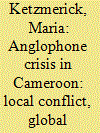

|
|
|
|
|
| Summary/Abstract |
After years of peaceful demonstrations, the Cameroonian Anglophone conflict escalated in 2017. Since the outbreak, over 3,000 people have died and a further thousand Anglophones fled from clashes between state forces and separatist fighters. While activists in the diaspora bid for international support, organizational belonging on the ground changes quickly. The paper investigates the transnationalization of the conflict by looking at the complex set of actors involved. Overall, it is interested in the political sociology of transnational rebel governance. The paper highlights the effects of transnational conflict dynamics on the unity and fragmentation of the self-determination movement and its relation to violence.
|
|
|
|
|
|
|
|
|
|
|
|
|
|
|
|
| 2 |
ID:
189356
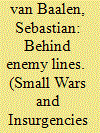

|
|
|
|
|
| Summary/Abstract |
This article examines the conditions that foster state-insurgent cooperation in rebel governance. State-insurgent cooperation is puzzling because it can alienate hardliners, undermine the parties’ legitimacy, reveal sensitive information, and cause autonomy losses. We propose that conflict parties are more likely to discount these costs when they have overlapping civilian constituencies with high governance provision expectations. Analysing rebel governance in Côte d’Ivoire and Sri Lanka using original data, we find that civilian expectations prompt cooperation even when the parties appeal to separate constituencies. The article nuances existing theories of rebel governance and contributes new knowledge on state-insurgent interactions in civil war.
|
|
|
|
|
|
|
|
|
|
|
|
|
|
|
|
| 3 |
ID:
189351


|
|
|
|
|
| Summary/Abstract |
This article analyzes the ways in which processes of weapons acquisition and armed collectives formation contribute to shape rebel polities – with their populations and attendant political geographies – in frontier spaces. It argues that the acquisition of weapons and the formation of an armed ensemble are shaped by political rationalities and techniques of governing the entanglements between humans and weapons that are diffused throughout society as a whole. Drawing on biopolitical governmentality, I also show that by governing weapons acquisition and the formation of an armed force rebel movements shape the rebel polity’s collective identity and political geographies of ‘vital’ space in frontiers. Harnessing fieldwork-based research to study Ta’ang rebel movements in Myanmar, I find that weapons acquisition and the formation of an armed ensembles have been inflected by govern-mentalities of narcotics eradication and ethnonationality. The article concludes that some forms of rebel rule at the edge of the state in Myanmar can be qualified as ‘blunt’ following work by anthropologist Elliott Prasse-Freeman. That is to say, rebel rule lacking the governmental apparatuses to intensively know and promote life at aggregate scales still operates massifications and divisions of biological populations and political space via the formation and governing of armed ensembles.
|
|
|
|
|
|
|
|
|
|
|
|
|
|
|
|
| 4 |
ID:
189350
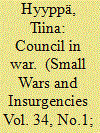

|
|
|
|
|
| Summary/Abstract |
governance have been neglected. This article explores the local council established in the rebel-held city of Daraya, Syria. It informs the fields of rebel governance and civil resistance, specifically wartime order, during civil wars and proposes that the forms and practices of local governance in Daraya exhibited a type of governance best labelled as ‘civilocracy’. In contrast to councils in other opposition-held parts of Syria, the council was established and led by civilians who welcomed rebels to work with them. Based on findings from in-depth, semi-structured interviews with former council members, the article finds that four factors were crucial for this form of governance to emerge and to endure. Key wartime events – a massacre and a siege –, earlier experiences of nonviolent activists, local ties, and the creation of a military office created a space for the maintenance of civil-led order. Daraya offers a fascinating example of how community’s norms affected how rebel governance was created and maintained. This research introduces a new concept to explain wartime order and encourages researchers to find causal explanations for the emergence of this particular governance form in other conflicts.
|
|
|
|
|
|
|
|
|
|
|
|
|
|
|
|
| 5 |
ID:
189354
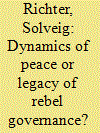

|
|
|
|
|
| Summary/Abstract |
In the academic literature, it is widely accepted that one of the most difficult steps in a peace process is the reincorporation of former combatants. Colombia is a case in point. After the peace agreement with the former rebel group FARC-EP in 2016, the reintegration process of more than 13.000 ex-combatants has been marred with difficulties, be it half-hearted implementation of the stipulations of the accord from the side of the government or the re-armament of some dissident groups. However, the dynamics of the peace process differ considerably between the national and the local level, offering a wide range of pathways from even more violent confrontation up to successful reincorporation projects. In order to explain this variety, we integrate DDR and rebel governance studies and assume that socio-political orders need to be re-configurated when rebel groups have established strong forms of rebel governance, as was the case with the FARC-EP. We argue that patterns of interaction between local conflict-affected communities and ex-combatants are the key explanatory variables for the dynamics of peace processes at local level. We differentiate between clustered and entrenched post-war orders and demonstrate our argument with two case studies based on comprehensive field research.
|
|
|
|
|
|
|
|
|
|
|
|
|
|
|
|
| 6 |
ID:
189359


|
|
|
|
|
| Summary/Abstract |
The contributors to this special issue have put forth a research agenda that centers the politics of civil war, in contrast to what the introduction presents as the dominant rationalist paradigm. This paper anchors the special issue by first synthesizing the works contained therein. In particular, the articles in this issue focus on how individual and collective identity, networks and orders, and learning or socialization from previous experiences shape behaviors during and after conflict. Next, the conclusion to this special issue aims to move forward a perspective of civil wars that takes seriously the political in civil war by building upon the works contained in this collection and presenting a number of avenues for future research. In particular, this article advocates for taking seriously how individual experiences, identities, and relationships embedded within broader social processes shape and co-constitute civil war dynamics.
|
|
|
|
|
|
|
|
|
|
|
|
|
|
|
|
| 7 |
ID:
189353


|
|
|
|
|
| Summary/Abstract |
Violence in post-conflict settings is often attributed to a post-war boom in organized crime, facilitated by the demobilization of armed groups and the persisting weakness of the state. The article argues that this is only one pathway of post-conflict violence. A second causal pathway emerges from the challenges that peace processes can constitute for entrenched local political orders. By fostering political inclusion, the implementation of peace agreements may threaten subnational political elites that have used the context of armed conflict to ally with armed non-state actors. Violence is then used as a means to preserve such de facto authoritarian local orders. We start from the assumption that these two explanations are not exclusive or competing, but grasp different causal processes that may well both be at work behind the assassination of social leaders (líderes sociales) in Colombia since the 2016 peace agreement with the FARC guerrilla. We argue that this specific type of targeted violence can, in fact, be attributed to different, locally specific configurations that resemble the two pathways. The article combines fuzzy-set Qualitative Comparative Analysis with the case studies of the municipalities of Sardinata and Suárez to empirically establish and illustrate the two pathways.
|
|
|
|
|
|
|
|
|
|
|
|
|
|
|
|
| 8 |
ID:
189348


|
|
|
|
|
| Summary/Abstract |
The introduction to the special issue starts from the observation that the political nature of rebel governance is so far understudied. Moving beyond the functionalism and instrumentalism inherent in parts of the literature, we propose a politicisation of the rebel governance paradigm through a spatial and temporal widening of analytical approaches. To address the methodological localism of existing research, rebel governance should be studied across actors and scales, as well as through their interlinkages. Taking time seriously, it also has to be investigated as a sequential phenomenon, at different conflict stages and with regard to its legacies in post-conflict settings.
|
|
|
|
|
|
|
|
|
|
|
|
|
|
|
|
| 9 |
ID:
189349
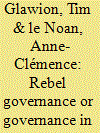

|
|
|
|
|
| Summary/Abstract |
Rebel governance assumes a symbiotic relationship between coercion and public goods provision. However, in the rebel-held town of Ndélé, Central African Republic, we find that governance happens in rebel-held territory, but rarely by rebels. Rebels allowed other actors to provide services for the people only when this did not hinder rebels extracting political clout and economic benefit from the people and their lands. We show how rebels’ extractive ambitions and governance discourses evolved during successive stages of rebellion through a diachronic comparison rooted in multimethod fieldwork from 2018 to 2022. We ask, why were rebel groups able to set up their rule, then rule for seven years, before ultimately losing power? Rebels evoked public goods at the onset of rebellion to justify the use of coercive means. After rebel rule was established, rebels outsourced public goods to international and state actors allowing for governance in rebel-held territory while focussing their own efforts on extraction. When their rule was challenged, rebels targeted governance actors and spaces in their territory in pursuit of economic gain and political dominance. Our findings call for a re-evaluation of existing rebel governance studies and the ways in which rebel groups are engaged with.
|
|
|
|
|
|
|
|
|
|
|
|
|
|
|
|
| 10 |
ID:
189352
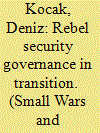

|
|
|
|
|
| Summary/Abstract |
This article investigates the transformation of the FALINTIL guerrilla organisation into the national armed forces in post-independence Timor-Leste. It focuses on how these former rebels interpret and legitimise their role in a changed socio-political environment vis-à-vis other national security actors as well as the population. By tackling the issue of the evolution of guerrilla organisations into formal security actors, the paper speaks to the recent research trend on the legacies of rebel governance, as well as the field of civil-military relations. Based on a qualitative interview case study, it argues that the behaviour of the state security actors, and their respective understanding of their role within the Timorese state, have been determined by internalised socialisation practices of their past. It becomes clear, that particularly the armed forces struggled with their constitutionally limited role on matters of national defence but strove to expand their role into domestic security affairs.
|
|
|
|
|
|
|
|
|
|
|
|
|
|
|
|
| 11 |
ID:
189358
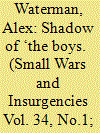

|
|
|
|
|
| Summary/Abstract |
This article leverages data from an oft-overlooked case of rebel governance – India’s United Liberation Front of Assam (ULFA) – to demonstrate the importance of de-centring territorial control as a prerequisite for rebel governance. ULFA neither controlled territory nor developed formalised bureaucratic institutions, yet its ‘parallel government’ held considerable sway over Assamese public life during 1985–1990, underpinned by its social embeddedness, influence upon media discourse and crucially its subversion of state structures, until its ability to limit state repression collapsed. The rise and fall of ULFA’s rebel governance illustrates the hybrid socio-political terrain upon which rebel governance is often laid.
|
|
|
|
|
|
|
|
|
|
|
|
|
|
|
|
| 12 |
ID:
189355


|
|
|
|
|
| Summary/Abstract |
When rebels and non-state actors provide services, do they have an effect on identities? The literature suggests that service provision by rebel’s influence identities, which affect post-conflict reconstruction and have some policy-implications on service provision. I argue that service provision has a potential effect on sub-identities and shape the preference of how people self-identify themselves. Based on a conjoint experiment in Gaza, I explore how Hamas’ governance has affected self-reported identities in the Gaza Strip after more than a decade of taking control of the Gaza Strip. The findings suggest that Hamas’s governance has influenced the self-reported identities in Gaza. It suggests that individuals with higher education, higher income and believes that Hamas provides less services tends to identify themselves in nationalistic sense as ‘Only Palestinian’, while individuals who identify themselves more as Muslims are less educated, have less income and more believes that Hamas provides more services than others.
|
|
|
|
|
|
|
|
|
|
|
|
|
|
|
|
|
|
|
|
|